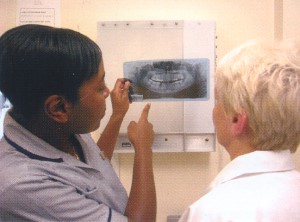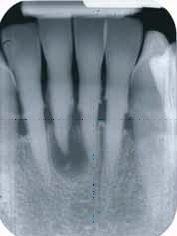Examination and Oral Health Score

What is it?
The dental examination shows how healthy your mouth
is. After the examination, you and your dentist can
discuss the results and plan the best way to deal with
any problems.
What will my dentist do?
As well as looking in your mouth, the dentist will ask you
some questions. These may include the following:
- Why you've come for an examination.
- Any problems you've noticed (such as pain
or sensitivity).
- Your general health and any medicines you might be
taking (because these can affect your dental care).
- Your diet (because sugary snacks and drinks can
cause tooth decay).
- How you clean you teeth (because correct cleaning
helps prevent tooth decay and gum disease).
- Smoking and drinking (because both can harm
your mouth).
The questions will depend on what the dentist sees in
your mouth. You should expect your dentist to:
- look at your face and neck to see that they are healthy;
- feel under your jaw;
- look inside your mouth, at your tongue, your cheeks
and lips, the roof of your mouth and the back of your
throat (places where there might be a problem that you
can't see or feel);
- look at your teeth and gums to see whether they are
healthy or whether there are signs of decay, damage or
gum disease (for children, your dentist will also look at
tooth and jaw development in case orthodontic
treatment might be needed now or later);
- compare your mouth now with how it was when they
last saw you;
- decide whether they need more information from
x-rays, plaster models or other special tests showing
how your teeth bite together; and
- tell you about any treatment you need, explaining the
choices and whether there will be any cost.
The examination may take longer if you are seeing a new
dentist for the first time.
What are the benefits?
- Regular examinations mean that your dentist can spot
problems and correct them early before the treatment
becomes complicated.
- A thorough examination helps you and your dentist
look after your mouth and prevent future problems.
The dentist will explain the options and then you can
decide together what will be best for you.
Oral Health Score© (OHS)
Your dentist will give you an Oral Health Score© (OHS).
This is a score, out of 100, which tells you how healthy
your mouth and teeth are.
Your OHS is made up of separate scores for the health of
your teeth and gums, the condition of any fillings, crowns
or other treatments you have done in the past, and your
own views about how your teeth and gums look, how
they feel and how efficient they are.
This is a totally new approach to keeping you in the
picture about your own dental health. It shows you how
your mouth, teeth and gums are benefiting from the care
you and your dentist give them.
The score is made up of the following (not all of them
may apply to you).
- How many teeth you have and how well they
bite together.
- How well any fillings, crowns and other dental work
are wearing.
- Whether you have any cavities (tooth decay).
- How healthy your gums and the inside of your mouth are.
- Your own opinion on how your teeth look, whether they
are comfortable and whether you can eat without
any problems.
- The condition of any dentures or dental implants.
Your dentist will check your Oral Health Score© regularly.
It will show any problems and help your dentist to work
with you to correct them.
If you have any questions, please ask your dentist or a
member of the practice staff, who will be pleased to help.
X-rays

What are they?
X-rays show what is happening inside and around the
tooth and its roots. They will show any decay or gum
disease, bone loss and, in children, how the jaw is
growing too.
Dentists use two types of x-ray. You grip a 'bitewing'
x-ray between your teeth and it shows the areas in
between the teeth but not the roots. A 'periapical' x-ray is
placed next to the tooth and shows the whole of the
tooth and its root.
There are also large x-rays which show all of the jaw and
teeth. These are called panoramic x-rays and the x-ray
machines moves around your head while you stand still.
What happens?
Trained members of the dentist's staff can take x-rays, as
well as the dentist. Training makes sure the x-rays are
taken safely, as well as being clear to read. There is a
small risk of radiation in x-rays that are taken for health
reasons but dental x-ray radiation is very low.
If you are concerned about safety, it may be helpful to
know that:
- your dentist will only take x-rays if they are needed;
- x-ray machines are checked regularly to make sure that
they are only using the intended radiation dose; and
- you can still have dental x-rays when you are pregnant.
(Your dentist may still ask you whether you are
pregnant or whether you might be; and whether you
would rather not have an x-ray)
When the x-ray is taken:
- you will need to keep very still for a few seconds to
give a clear picture;
- the film is usually developed while you wait and then
labelled, unless it is a digital x-ray where you will see
the results immediately on the computer screen; and
- sometimes it is useful for the dentist to compare a new
x-ray with one taken some time ago. Your dentist will
keep old x-rays in your file.
What are the benefits?
- All forms of dental treatment rely on dental x-rays.
Simply looking in your mouth cannot give the dentist as
much information.
- X-rays allow your dentist to review old treatment as
well as identify new problems.

